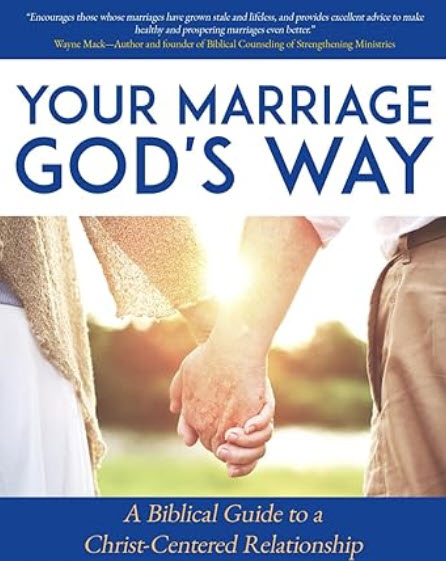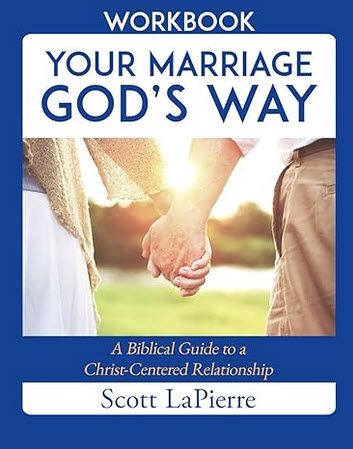I received a complimentary review copy of Marriage God’s Way and the corresponding workbook in exchange for my honest review. The opinions in this post are completely my own, and not influenced in any way by receiving a review copy. This post contains affiliate links. See full disclosure here.
Submission.
The word strikes fear, anger, and even outright hostility from women everywhere.
And for Christian wives, the word is even more emotionally charged. After all, to be a “Good Christian Wife” you’re supposed to submit to your husband. While my clients and blog readers come from many different faiths (or no faith at all), many are Christian. (If that’s not you, feel free to skip this post, or read it anyway – it’s up to you!)
And so many of these women confess that the idea of submission conflicts with their feelings of self worth or their efforts to heal from previous (or current) life trauma.
Self-worth is built on the pillars of competence, character and core values. Living by your core values supports your self esteem. For Christian women, that includes living in our marriages in alignment with our faith. But it’s hard to do that when our faith seems to demand that we accept a lesser status. When we’ve been (wrongly) beaten over the head to submit and accept our role, no matter how our husbands act.
How do you live by your core values in your marriage when your faith appears to conflict with your very survival?

Submission and Abuse
I admit, I used to be the poster child for rebellion when it came to submission. At 18 years old, after ending an abusive relationship with a man who raped me for three years, I vowed never to be taken advantage of in that way again. But then I started studying the Bible, and came smack up against the issue of submission.
I actually yelled at my mom, “There’s no way I’m gonna submit myself to any man, ever again!” I stomped around the house, slamming doors for several days before finally studying the issue out further, correcting my faulty view of submission, and surrendering to God’s plan for marriage.
Then I married a verbally and emotionally abusive man (long story), and our church leadership berated me over and over again about submission and my role as a Christian wife. They twisted Scripture to justify and enable my ex-husband’s destructive behavior. They told me (wrongly) to accept “anything for the sake of peace.” To basically suck it up and stop complaining. To do whatever he said because he was the “head” of our relationship. They never challenged him on his selfish, unloving, and utterly unChrist-like treatment of me. Needless to say, the abuse worsened, and my spirit shattered.
Moving on despite it all
My self worth took a nosedive. I utterly lost my Self. But I determined to not let that experience wreck my faith. That marriage ended after five years. I eventually left that church found a new church that does not condone abuse and mistreatment. (Hallelujah!)
I studied and researched the heck out of biblical marriage, Paul’s views on women, and the historical context in which he wrote his letters. Obviously, I have some pretty strong opinions on the matter. (And I should mention that I’ve now been married to an amazing, godly man for 14 years and counting.)
Verses about submission are probably some of the most hated, the most misunderstood, the most misused Scriptures in the Bible.
Naturally, then, I’m always skeptical about marriage books for Christians. After all, I’ve read way too many books and heard way too many sermons where women are commanded to submit to their husbands no matter what. But husbands are NOT commanded to love their wives in the self-sacrificial way that Christ loved the church. Are you with me?
Marriage God’s Way
Then I found Marriage God’s Way: A Biblical Recipe for Healthy, Joyful, Christ-Centered Relationships, by Scott LaPierre. And I have to say, it pleasantly surprised me.
In all honesty, I spent the first few chapters “on guard,” especially because he addresses women first. But I realized my hackles were raised not by what he actually said, but by what I thought he would say. It’s easy to read into an author’s words and think they’re saying what they’re not. We’re conditioned by our culture to react, to resist, and to refuse things that make us uncomfortable.
I’ll give you an example. He states that women generally go from being under their father’s authority to under their husband’s authority. Hold up. Does he mean that women are supposed to live with their parents until they get married? Never work, or go to school, or live on their own? He didn’t say that at all.
But the hurt, bruised, and battered woman inside me wanted to think that he said it. On the contrary, he gives one of the best explanations of the Proverbs 31 woman I’ve ever read, emphasizing that she was actually an entrepreneur. Rather than a complacent, milk-toast doormat of a woman, this biblical ideal is strong, resourceful, and proactive.
In all reality, Marriage God’s Way is a very fair, even-handed approach to biblical marriage. It includes the most instruction specifically directed to husbands – their role, responsibility, and accountability – that I’ve ever read in a Christian marriage book.
What’s great about the book
Here are some of my favorite parts of Marriage God’s Way:
- LaPierre clearly lays out the destructive tendencies that both men and women face in marriage – namely, the temptation for women to control their husbands, and the temptation for men to dominate their wives. When you understand these two inclinations, it’s easier to understand the Bible’s teaching to couples.
- For all my strong-willed sisters who’ve been hurt by admonitions to have a “gentle and quiet spirit,” you’ll love his explanation of how a quiet spirit does not mean a quiet “mouth.”
- The author gives practical examples of how husbands and wives should treat each other (and very real consequences for not doing so).
- He explains the difference between a wife’s phileo (respectiful, strong affection) love for her husband, and a husband’s agape (unconditional, self-sacrificial) love for his wife – and why it matters so much to the recipient of that love. And what each type of love looks like in every day living.
- He clarifies what submission really entails, and, more importantly, what it does NOT. (Spoiler alert, it’s not carte blanche for a man to bully, browbeat, or batter his wife. The Bible actually calls men to submit as well, just like Jesus did.)
- He describes helpful (and hurtful) ways to support each other when your spouse blows it.
- He goes beyond marriage roles and lays out a clear path for keeping God at the center of your relationship.
My one word of caution:
LaPierre does an excellent job of discussing intimacy within marriage – both in terms of why it’s important and how intimacy (or the decision to not be intimate for a time) should always be tempered with “love, gentleness, compassion, and [mutual] deference in the marriage relationship.” He goes on to say that, in deciding whether or not to be intimate on a specific occasion, “the potential consequences of not satisfying your spouse far outweigh the ‘consequences’ – if you want to call it that – of satisfying your spouse.” (p. 208, emphasis mine.)
 Now, in all fairness, the author means in general terms for most people. I doubt trauma even entered his mind when he wrote this sentence. However, I view everything from a trauma-informed approach. (And if you’re reading this blog, chances are you experienced some form of trauma in your life as well.)
Now, in all fairness, the author means in general terms for most people. I doubt trauma even entered his mind when he wrote this sentence. However, I view everything from a trauma-informed approach. (And if you’re reading this blog, chances are you experienced some form of trauma in your life as well.)
For someone with a history of trauma, denying their self to please their spouse actually can have significant consequences. For many women, their trauma involved a forceful subjugation of their will for someone else’s sexual pleasure. If that’s the case, don’t read the author’s words as a directive to ignore your own feelings or minimize the negative impact a potential intimate encounter may have on you.
If you are triggered, experiencing flashbacks or any other pressing after-effects of your trauma, it is perfectly appropriate to abstain from intimacy for a period of time. (That’s where, hopefully, your spouse exhibits the gentleness, compassion and mutual deference the author referenced.)
The Bottom Line
Women who’ve been hurt, who are used to fighting for their rights, often find it difficult to surrender to a position that makes them feel vulnerable. But Marriage God’s Way explains clearly that God’s plan for marriage isn’t about women being weak, subjugated, or inferior. God’s expectations for wives celebrate their God-given strengths. And his expectations for husbands actually protect and build up their wives.
All in all, Marriage God’s Way is one of the best books on Christian marriage I’ve read in a long time. And I don’t say that lightly. LaPierre’s points are well researched. I appreciate his even-handed and fair treatment of husbands and wives. He says things that may be hard to hear, but always does not without even a hint of condescension or guilt. (Goodness knows we get enough of that elsewhere!)
LaPierre recommends that a husband and wife read Marriage God’s Way together. I agree. That way, both people see God’s expectations for themselves and their partner. Reading the book together will strengthen your marriage, help resolve conflict, and get you both on the same page in your relationship. I recommend that you read the book together for devotional time.
 Do yourself a favor and get the Marriage God’s Way Workbook, as well. Actually, get two – one for each of you to write in. The workbook teaches you how to deal with the inevitable tension that will arise in your marriage from working through these issues, including how to apologize the right way – and how to forgive. The questions help you transform the “head” knowledge from the book into “heart” knowledge and practical change.
Do yourself a favor and get the Marriage God’s Way Workbook, as well. Actually, get two – one for each of you to write in. The workbook teaches you how to deal with the inevitable tension that will arise in your marriage from working through these issues, including how to apologize the right way – and how to forgive. The questions help you transform the “head” knowledge from the book into “heart” knowledge and practical change.After all, information without action is merely entertainment. So buy the workbook. Answer the questions. Make it personal.
Do the work. You, and your marriage, are worth it.
To learn more about Scott LaPierre, visit www.scottlapierre.org.
The book and the workbook are available on Amazon.





2 replies to "Marriage God’s Way Book Review"
Holly,
Thank you so much for reading and reviewing Marriage God’s Way and the workbook! I’m blessed by your words and the way God has used (and hopefully continues to use) my materials in your life and marriage.
For anyone who reads this, if you would like free chapters of my books (including the Marriage God’s Way book and workbook), please subscribe to my newsletter: https://www.subscribepage.com/ScottLaPierre. Also, if I can pray for you in any way, please let me know.
God bless,
Scott LaPierre
Scott, it was truly a pleasure. I’m so glad we crossed paths, and I look forward to reading your other book as well. Best of luck and God’s blessings as you transform the lives of those who are touched by your work.